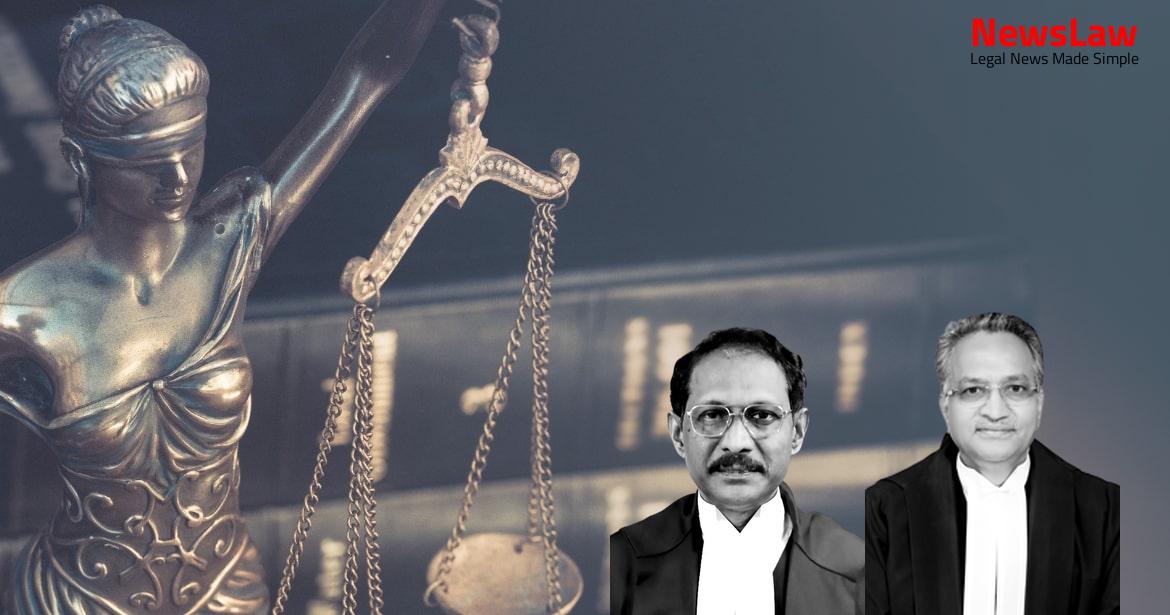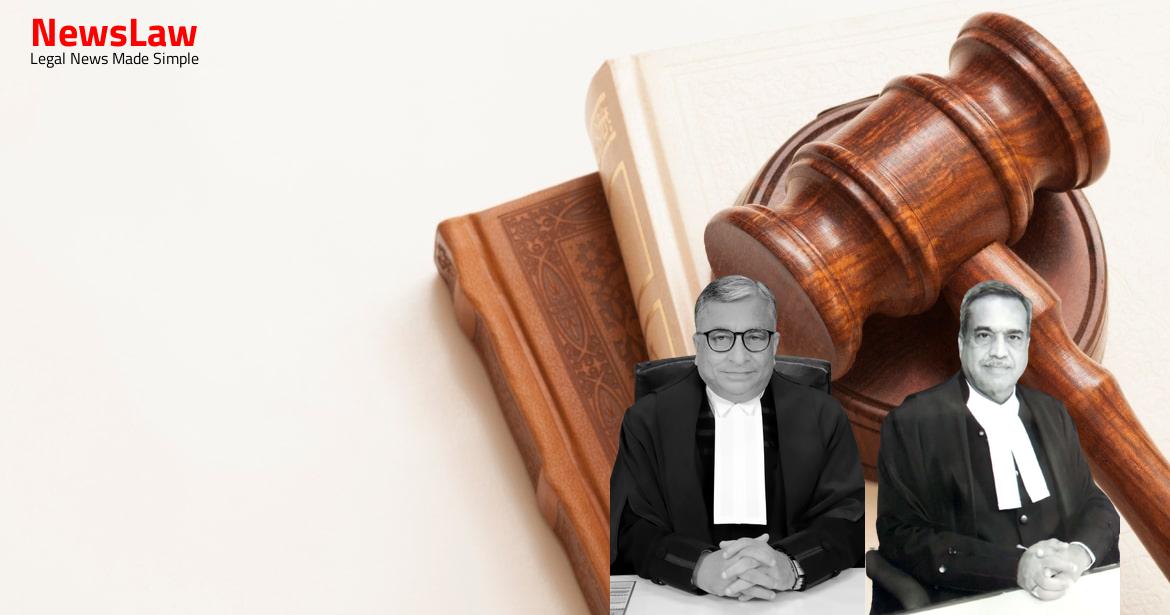In a recent legal case, the High Courts grappled with the pivotal question of whether Chief Metropolitan Magistrates/District Magistrates possess the authority to appoint advocates in cases involving secured assets under the 2002 Act. The courts’ varied interpretations shed light on the nuances of legal analysis and underscore the complexities inherent in navigating legislative provisions.
Facts
- The Bombay High Court considered the issue of whether Section 14(1A) of the 2002 Act allows the CMM/DM to authorize an advocate, concluding that it does not permit such delegation to anyone other than a subordinate officer.
- The High Court noted two issues for consideration: the appointment of an advocate commissioner by the CMM/DM and the non-compliance of clauses (i) to (ix) of Section 14(1) of the 2002 Act by the secured creditor.
- The High Court rejected the argument that the CMM/DM lacked staff and deemed it difficult for the secured creditor to take possession of assets, choosing to strictly interpret the provision in question.
- The Debt Recovery Tribunal allowed an appeal stating that the secured creditor failed to comply with the specified procedures and that the appointment of the Advocate Commissioner was illegal.
- The High Court accepted the secured creditor’s argument that the CMM/DM had the authority to appoint an advocate, setting aside the declaration of the borrowers’ account as a Non-Performing Asset.
- The borrowers contested the appointment of an advocate commissioner, arguing against the conclusion of the Tribunal regarding non-compliance with clauses (i) to (ix) of Section 14 of the 2002 Act.
- The Tribunal allowed the challenge against the Bank’s decision on 4.2.2020.
- The Bank’s appeal to the Madras High Court was unsuccessful.
- Despite demands, the loan remained unpaid, leading to the Bank invoking action under Section 14 of the 2002 Act.
- The borrowers challenged the sale notice through application S.A. No.59 of 2019, but no injunction was granted.
- The Bank’s application under Section 14 was disposed of on 6.8.2019 by appointing an Advocate Commissioner.
- The notice under Section 13(2) of the 2002 Act was issued and published in newspapers.
- The Bank eventually took symbolic possession of the property after issuing a possession notice, communicated to borrowers on 11.10.2019.
Also Read: Land Acquisition Act Interpretation Case
Issue
- The seminal question in these cases is whether the District Magistrate or Chief Metropolitan Magistrate can appoint an advocate to take possession of secured assets and documents under Section 14(1A) of the Securitisation and Reconstruction of Financial Assets and Enforcement of Security Interest Act, 2002.
- The High Court of Bombay held that such appointment by an advocate would be illegal as they are not subordinate officers to the CMM or DM.
- The High Court of Madras, however, took a contrary view by considering advocates as officers of the court and therefore subordinate to the CMM or DM.
- The High Courts of Kerala, Madras, and Delhi have also supported the view that advocates can be appointed by CMM/DM for such purposes.
- The common question in all these cases is regarding the authority of CMM/DM to appoint an advocate under Section 14(1A) of the 2002 Act.
Also Read: Analysis of Compensation Method in Land Acquisition Case
Analysis
- The Bombay High Court observed that the previous decision did not consider the precise question addressed in the current judgment.
- The dictum in the previous decision was not relevant to the specific issue at hand.
- This raised a discrepancy between the two judgments on the matter.
- The expression “any” in Section 14(1A) has not been defined in the 2002 Act or Rules.
- The appointment of an officer subordinate should be capable of handling the tasks.
- The provision does not prevent the CMM/DM from appointing an advocate for ministerial work.
- Prudence should be exercised in appointing a capable person to execute orders.
- The advocate appointed need not be on the rolls of the CMM/DM office or in public service.
- Appointment of an advocate as a receiver is not prohibited by Section 14(1A).
- The insertion of sub-Section (1A) is not to grant new power but to clarify existing powers.
- The choice of the subordinate officer lies with the District Magistrate/Chief Metropolitan Magistrate.
- The amendment gives discretion to authorize possession either directly or through a subordinate officer.
- An advocate must be regarded as an officer of the court and subordinate to the CMM/DM.
- The appointment of an advocate commissioner to assist in executing orders is permissible.
- The High Court of Delhi’s attention was drawn to the issue in Rahul Chaudhary.
- The receiver was appointed by the learned CMM through an order dated 05.12.2019, with an advocate appointed to take possession of the secured asset.
- The term ‘subordinate’ in legislation makes punishable individuals not directly connected with the relevant functions of a business or transaction.
- The term ‘subordinate’ refers to someone of an inferior rank or class, dependent on another’s authority.
- The decision in B. Veeraswamy v. State of Andhra Pradesh, (1959) Andh. W.R.308 at p.314: A.I.R. 1959 A.P. 413 (F.B.) established the interpretation of ‘subordinate’.
- The dismissal of S.L.P. (Civil) No.1671 of 2009 finalized the decision.
- The High Court of Kerala’s judgment in Muhammed Ashraf set a precedent before the amendment of Section 14.
- The case of O.P. Sharma & Ors. vs High Court of Punjab & Haryana emphasized the importance of advocate diligence and conduct.
- Advocates are considered officers of the court, upholding dignity and decorum.
- Advocates have a duty to society, justice, and the court before their duty to their clients.
- The role of advocates as guardians of constitutional morality and justice was discussed.
- The legislative intention in using the term ‘subordinate’ was to include punishment for those of lower rank, irrespective of their direct involvement in relevant functions.
- The 2002 Act allows the secured creditor to take possession of assets before and after confirmation of sale.
- The authorised officer of the bank can take possession of immovable property by delivering a possession notice and publishing it in newspapers.
- The role of the Chief Metropolitan Magistrate (CMM) or District Magistrate (DM) is to assist in taking possession of secured assets upon request by the secured creditor.
- The CMM/DM must verify compliance with formalities by the secured creditor before taking possession and forwarding the assets to the creditor.
- The sale of immovable property can be conducted through various methods like public auction, tenders, or private treaty.
- Detailed terms and conditions of the sale must be uploaded on the web-site of the secured creditor.
- Notices of sale must be affixed on the property and served to the borrower with a 30-day notice period. Public notices must also be published in newspapers.
- The authorised officer is responsible for the preservation, protection, and insurance of the secured assets until they are sold or disposed of.
- The High Courts of Kerala, Madras, and Delhi have upheld the conclusion on the question at hand.
- The Madras High Court’s view on the power of the CMM/DM to appoint an Advocate Commissioner was agreed upon.
- S.L.P (Civil) No 12011 of 2020 filed by the borrowers needs to be delinked and heard separately for admission but limited to the first issue concerning compliance or non-compliance of clauses (i) to (ix) of Section 14 of the 2002 Act.
Also Read: Legal Analysis in a Landmark Case
Case Title: NKGSB COOPERATIVE BANK LIMITED Vs. SUBIR CHAKRAVARTY (2022 INSC 238)
Case Number: C.A. No.-001637-001637 / 2022



